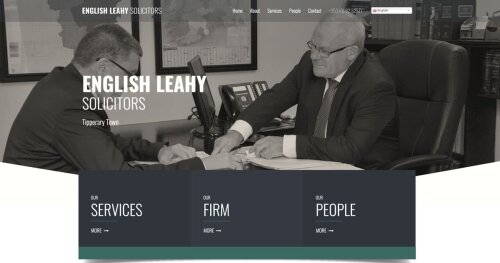Best Elder Law Lawyers in Ireland
Share your needs with us, get contacted by law firms.
Free. Takes 2 min.
Or refine your search by selecting a city:
List of the best lawyers in Ireland
About Elder Law in Ireland
Elder Law in Ireland focuses on addressing the legal concerns faced by older adults and their families. This area of law encompasses various issues such as healthcare, estate planning, guardianship, and the protection of elder rights. With the ageing population, ensuring proper legal frameworks for safeguarding the interests and rights of the elderly has become increasingly important. Elder Law helps in navigating complex legal situations, offering peace of mind to individuals and their families.
Why You May Need a Lawyer
There are several situations where hiring a lawyer specializing in Elder Law might be essential. Common scenarios include:
- Planning for long-term care or navigating healthcare options and funding.
- Creating or updating wills and trusts to ensure intentions are honored posthumously.
- Setting up Powers of Attorney or advance healthcare directives.
- Addressing issues of elder abuse or neglect.
- Managing disputes related to guardianship or conservatorship.
- Resolving conflicts among family members regarding an elder's care or estate.
- Ensuring proper management and distribution of assets and estates.
Local Laws Overview
Elder Law in Ireland is governed by a set of regulations and acts designed to protect the rights and wellbeing of older adults. Key aspects of these laws include:
- Assisted Decision-Making (Capacity) Act 2015: This act provides a detailed framework for supporting decision-making for adults with cognitive impairments, establishing mechanisms like enduring powers of attorney and advance healthcare directives.
- Nursing Homes Support Scheme Act 2009: Also known as the Fair Deal Scheme, this act provides financial support for individuals needing long-term residential care, determined by means testing.
- Health Act 2007: This established standards for the regulation and inspection of healthcare providers, ensuring the safety and wellbeing of older adults in care facilities.
- Pensions Act 1990: Regulates pension schemes and protections, crucial for financial planning in retirement.
Frequently Asked Questions
1. What is a Power of Attorney?
A Power of Attorney is a legal document that allows one person (the principal) to appoint another person (the attorney) to act on their behalf, especially in financial or medical matters, in case they lose the capacity to make their own decisions.
2. How does the Fair Deal Scheme work?
The Fair Deal Scheme provides financial support for older adults in need of long-term residential care. It assesses the individual's income and assets to determine their contribution to care costs, with the state covering the balance.
3. What is elder abuse, and what should I do if I suspect it?
Elder abuse includes physical, emotional, financial, or sexual harm to an older person. If you suspect elder abuse, contacting An Garda Síochána or the HSE Elder Abuse Service is recommended.
4. How can I plan my estate effectively in Ireland?
Effective estate planning involves creating a will, setting up trusts, and possibly arranging enduring powers of attorney. It ensures your assets are managed and distributed according to your wishes.
5. What are the residency requirements for Irish pension benefits?
Eligibility for state pensions generally requires having made appropriate social insurance contributions and reaching the qualifying age. Residency requirements may apply for certain benefits.
6. Can I contest a will in Ireland?
Yes, a will can be contested under certain conditions, typically due to concerns about the will's validity, such as undue influence, fraud, or lack of testamentary capacity.
7. What is an advance healthcare directive?
An advance healthcare directive allows an individual to outline their preferences for medical treatment should they be unable to make decisions in the future, guiding healthcare providers and loved ones.
8. How can I protect my assets from nursing home costs?
Planning ahead by consulting with an Elder Law attorney can help protect assets, potentially through transfer strategies or setting up specific types of trusts.
9. Who qualifies for a medical card, and what does it cover?
Eligibility for a medical card depends on your income and means. The card provides access to a range of health services at no cost, including GP visits and hospital care.
10. What happens if I don't have a will?
If you die without a will, your estate is distributed according to the rules of intestacy, which may not align with your personal wishes. It highlights the importance of creating a will.
Additional Resources
Several resources can offer guidance and support regarding Elder Law in Ireland, including:
- Citizens Information Board: Provides detailed information on legal rights and entitlements.
- Age Action Ireland: Advocates for older people and provides valuable advice on aging-related issues.
- Free Legal Advice Centres (FLAC): Offers free legal information and advice.
- Health Service Executive (HSE): Provides information on healthcare services and elder abuse reporting.
Next Steps
If you're considering legal advice in Elder Law, it is advisable to:
- Clearly identify the areas where you need help, such as estate planning, guardianship, or healthcare decisions.
- Gather relevant documents, such as wills, medical records, or financial statements, to assist in legal consultations.
- Contact a qualified solicitor specializing in Elder Law. The Law Society of Ireland can provide a directory of qualified practitioners.
- Explore community resources and support groups that can offer guidance or referrals.
- Prepare your questions in advance to make the most of your consultation.
Engaging an Elder Law solicitor can ensure that you or your loved ones are well-prepared to handle the complexities of aging, safeguarding rights, and planning for the future.
Lawzana helps you find the best lawyers and law firms in Ireland through a curated and pre-screened list of qualified legal professionals. Our platform offers rankings and detailed profiles of attorneys and law firms, allowing you to compare based on practice areas, including Elder Law, experience, and client feedback.
Each profile includes a description of the firm's areas of practice, client reviews, team members and partners, year of establishment, spoken languages, office locations, contact information, social media presence, and any published articles or resources. Most firms on our platform speak English and are experienced in both local and international legal matters.
Get a quote from top-rated law firms in Ireland — quickly, securely, and without unnecessary hassle.
Disclaimer:
The information provided on this page is for general informational purposes only and does not constitute legal advice. While we strive to ensure the accuracy and relevance of the content, legal information may change over time, and interpretations of the law can vary. You should always consult with a qualified legal professional for advice specific to your situation.
We disclaim all liability for actions taken or not taken based on the content of this page. If you believe any information is incorrect or outdated, please contact us, and we will review and update it where appropriate.
Browse elder law law firms by city in Ireland
Refine your search by selecting a city.
















